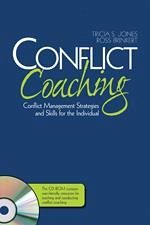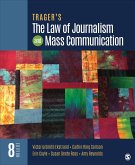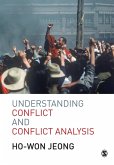Recent research shows that between 25-85% of conflict disputants referred to mediation choose not to participate (i.e., they resist wanting to meet face-to-face). In the field of conflict resolution, conflict coaching is the only process that has emerged which allows resolution methods to work on a one-on-one basis. Conflict Coaching: Conflict Management Strategies and Skills for the Individual defines this growing area of conflict resolution and distinguishes conflict coaching as a stand-alone resolution technique. In a service society where human relationships are central to our professional as well as personal lives, individuals value one-on-one attention to obtain custom solutions for handling important interpersonal communication.
Rooted in research and theory, the text is organized into three sections, Introducing Conflict Coaching, Conducting Conflict Coaching, and Integrating Conflict Coaching, and offers a practical model for coaching. It is a useful volume for students and practitioners in a range of academic disciplines including communication, alternative dispute resolution/conflict resolution, business, education, law, psychology, sociology, and social work.
The CD-ROM accompanying the book provides numerous resources for instructors, coaches, and other interested readers, including: worksheets for techniques and approaches presented in the chapters; feedback forms for clients and their organizations; sample syllabi, learning objectives, paper assignments; PowerPoints; additional case studies and readings; and suggested hyperlinks to relevant Web sites.
"In Conflict Coaching, Tricia S. Jones and Ross Brinkert have made a timely contribution to the advancement of the field of conflict analysis and dispute resolution. They simultaneously present a clear vision of the role of a conflict coach as well as a persuasive argument for a new and expanded mind set on who it is we say we are and what it is we say we do. The bookmakes credible arguments about the need for the conflict coach and then clearly blows open a much needed area of practice that has been unnecessarily restrained by outdated and untestable notions. The authors accomplish this by combining first rate scholarship with an easy to read guide on the practice of conflict coaching to create an evolutionary path within the field. From this book expect to see a flurry of other scholars and practitioners follow their lead in both print and practice."
-Brian Polkinghorn, Ph.D.
Distinguished Professor and Director
Conflict Analysis and Dispute Resolution
Wilson Elkins Professor, University System of Maryland
Executive Director, Center for Conflict Resolution, Salisbury University
"Conflict Coaching is a book that should be in every corporate library and in every chief human resource officer's desk so others can see it! Moreover, this book should be provided for every young, high-potential corporate manager and be required reading in business school executive education programs."
-Frank P. Brennan, JE.
Former Chief of staff to the postmaster general of the United States
"Jones and Brinkert offer example case studies illustrating the subject of each chapter, scholarly research throughout, a wonderfully approachable text and a companion CD of tools that makes a perfect addition to any Ombudsperson's library. Not only is this a terrific resource for us LTCOs, but also for Organizational Ombuds and other ADR professionals and practitioners seeking to clarify the whats and hows of empowering those we serve to better respond to the conflicts they face."
-Drew Strayer, LTCO and NALLTCO's Ohio State Coordinator
Rooted in research and theory, the text is organized into three sections, Introducing Conflict Coaching, Conducting Conflict Coaching, and Integrating Conflict Coaching, and offers a practical model for coaching. It is a useful volume for students and practitioners in a range of academic disciplines including communication, alternative dispute resolution/conflict resolution, business, education, law, psychology, sociology, and social work.
The CD-ROM accompanying the book provides numerous resources for instructors, coaches, and other interested readers, including: worksheets for techniques and approaches presented in the chapters; feedback forms for clients and their organizations; sample syllabi, learning objectives, paper assignments; PowerPoints; additional case studies and readings; and suggested hyperlinks to relevant Web sites.
"In Conflict Coaching, Tricia S. Jones and Ross Brinkert have made a timely contribution to the advancement of the field of conflict analysis and dispute resolution. They simultaneously present a clear vision of the role of a conflict coach as well as a persuasive argument for a new and expanded mind set on who it is we say we are and what it is we say we do. The bookmakes credible arguments about the need for the conflict coach and then clearly blows open a much needed area of practice that has been unnecessarily restrained by outdated and untestable notions. The authors accomplish this by combining first rate scholarship with an easy to read guide on the practice of conflict coaching to create an evolutionary path within the field. From this book expect to see a flurry of other scholars and practitioners follow their lead in both print and practice."
-Brian Polkinghorn, Ph.D.
Distinguished Professor and Director
Conflict Analysis and Dispute Resolution
Wilson Elkins Professor, University System of Maryland
Executive Director, Center for Conflict Resolution, Salisbury University
"Conflict Coaching is a book that should be in every corporate library and in every chief human resource officer's desk so others can see it! Moreover, this book should be provided for every young, high-potential corporate manager and be required reading in business school executive education programs."
-Frank P. Brennan, JE.
Former Chief of staff to the postmaster general of the United States
"Jones and Brinkert offer example case studies illustrating the subject of each chapter, scholarly research throughout, a wonderfully approachable text and a companion CD of tools that makes a perfect addition to any Ombudsperson's library. Not only is this a terrific resource for us LTCOs, but also for Organizational Ombuds and other ADR professionals and practitioners seeking to clarify the whats and hows of empowering those we serve to better respond to the conflicts they face."
-Drew Strayer, LTCO and NALLTCO's Ohio State Coordinator
"In Conflict Coaching, Tricia S. Jones and Ross Brinkert have made a timely contribution to the advancement of the field of conflict analysis and dispute resolution. They simultaneously present a clear vision of the role of a conflict coach as well as a persuasive argument for a new and expanded mind set on who it is we say we are and what it is we say we do. The book makes credible arguments about the need for the conflict coach and then clearly blows open a much needed area of practice that has been unnecessarily restrained by outdated and untestable notions. The authors accomplish this by combining first rate scholarship with an easy to read guide on the practice of conflict coaching to create an evolutionary path within the field. From this book expect to see a flurry of other scholars and practitioners follow their lead in both print and practice."
-Brian Polkinghorn, Ph.D.
Distinguished Professor and Director
Conflict Analysis and Dispute Resolution
Wilson Elkins Professor, University System of Maryland
Executive Director, Center for Conflict Resolution, Salisbury University
Brian Polkinghorn, Ph.D. 20080224








